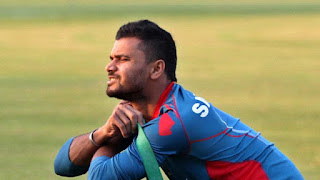ISLAMABAD: Prime Minister Nawaz Sharif on Friday held a meeting with
President of the Republic of Belarus Alexander Lukashenko, who started
his two-day visit to Pakistan yesterday, reports Dawn.
During the meeting at the Prime Minister House, the premier extended
condolences to President Lukashenko over the death of his mother two
days ago, which was also the reason why the Belarusian president delayed
his visit to Pakistan until May 28.
Prime Minister Nawaz Sharif told President Lukashenko that Pakistan is
keen to forge closer ties with Belarus in all fields including trade,
economy, defence and culture.
“Your visit will act as a catalyst in developing strong political and
economic relations between our two countries,” the premier told the
Belarusian president.
The prime minister said he was pleased with the increased exchanges
between the Pakistan and Belarus in the recent past and there was a need
to further increase frequency of bilateral visits.
“We also need to encourage contacts between our parliamentarians as
regular interaction among them is beneficial for creating an environment
of cordiality and friendship between the two peoples,” the premier
said.
He said the current bilateral trade between the two countries standing
at $60 million is not commensurate with its potential and needs to be
substantially increased.
“We need to establish close interaction between the respective chambers
of commerce and industry as these will boost bilateral trade and
investmen,” he told the visiting delegation.
Belarusian delegation attending the meeting included: Deputy Prime
Minister Semashko Vladimir, Minister for Foreign Affairs Makei Vladimir,
Assistant to the President Bryliov Valery, Head of National Academy of
Science Gusakov Vladimir, Minister of Industry Vovk Vitaly, Minister of
Agriculture Zayats Leonid, Head of the State Military Industrial
Committee Gurulev Sergei, Ambassador of the Republic of Belarus
Ermolovich Andrei, Director of Machinery Holding “Amcodor” Shakutin
Aleksandr, Director of Belarusian Chamber of Commerce and Industry
Miatlikov Mikhail, Dy Chairman Mogilev Regional Executive Committee
Nekrashevich Viktor, Director of Belarusian Light Industry Concern
Efimchik Nikolai, and Director of “Minsk Tractor Works” Domoteko Fedor.
Those attending the meeting from the Pakistan side included: Minister
for Commerce Khurram Dastgir Khan, Minister for Defence Production Rana
Tanveer Hussain, Minister for Finance Muhammad Ishaq Dar, Minister for
Information Pervaiz Rashid, Advisor to the prime minister on National
Security Sartaj Aziz, Special Assistant to Prime Minister Tariq Fatemi,
Chairman Board of Investment Mifta Ismail, and Secretary Foreign Affairs
Aizaz Ahmed Chaudhry.
After delegation-level talks, the two sides held a joint press conference.
Addressing the press conference the prime minsiter said, “I am happy to
be standing here with my distinguished visitor from the Republic of
Belarus, President Alexander Lukashenko who is in Pakistan on the first
ever Presidential visit from this beautiful country.”
“Belarus is an important country and we attach high importance to our
bilateral relations with it. We greatly value the visit by the President
and his high powered delegation,” he said.
He added, “We just concluded a very productive round of talks. We
discussed our relations in all fields in particular, trade, industry,
agriculture, investment, culture, education and people-to-people
contacts. We agreed on several new initiatives.”
“We also agreed to intensify our inter-parliamentary relations and
confirmed our willingness to strengthen cooperation in the fight against
terrorism, extremism, narcotics, and human trafficking.”
The premier also divulged about the Memorandums of Understanding (MoUs)
signed between the two counties saying, “A few moments ago, we happily
witnessed the signing of many important Agreements which will provide a
structured framework for our future collaboration.”
Nawaz further said Pakistan provides excellent environment for foreign
investors and that Pak-Belarus joint ventures in various sectors are on
the horizon.
He thanked President Lukashenko for the invitation that he extended to the prime minister to visit Belarus.
“I am delighted to accept it and look forward to an early visit,” the premier said.
Earlier on Thursday, President Lukashenko was received by Prime Minister
Nawaz Sharif at Nur Khan airbase upon his arrival in Islamabad on a
two-day state visit on the invitation of President Mamnoon Hussain. This
is the first visit by a Belarusian president to Pakistan.
On the first day of the President Lukashenko’s visit, Pakistan and
Belarus vowed to build a broad-based, substantive and long-term
relationship in all fields, including trade, economic, education,
defence and culture.
President Hussain hosted a banquet in honour of his Belarusian counterpart.
During his meeting with the Belarusian leader followed by
delegation-level talks, President Hussain said Pakistan valued its ties
with Belarus and both countries enjoyed a warm and a cordial
relationship.
Meanwhile, Sergei Gurulev, Chairman State Military Industrial Committee,
Belarus, called on Chairman Joint Chiefs of Staff Committee Gen Rashad
Mahmood and discussed matters relating to professional interest and
mutual cooperation between the two armed forces.
According to the ISPR, the two agreed that there was great scope for cooperation in the field of defence industry.









